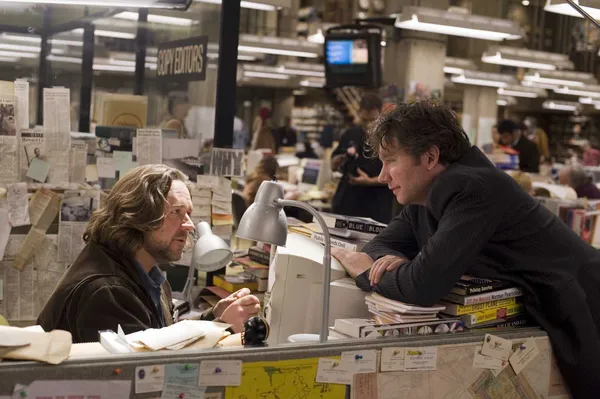Eye For Film >> Movies >> State Of Play (2009) Film Review
State Of Play
Reviewed by: Jeff Robson

Film adaptations are tricky things – whether it’s of a book, play, graphic novel or range of convertible Eighties toys there will always be fans who will regard any new version as an act of heresy.
And your problems are squared when the original happened to be one of the best TV dramas of the last decade. The BBC’s 2003 series State Of Play was a cracking conspiracy thriller told with a glorious script and high production values.

Add a long gestation period plus some major cast changes (Brad Pitt and Edward Norton were originally scheduled to play the two main protagonists) and you can see why some people predicted the big-screen American version would be a stinker.
Happily, it isn’t. The producers (including original series creator Paul Abbott) have kept what was best about the original, added some interesting touches and resisted the temptation to pile on the contrivances and explosions.
The choice of director was a good starting point, too. Kevin Macdonald made his name with film documentaries such as Touching The Void and One Day In September, which shared a few chromosones with the investigative journalism at the heart of State Of Play, then moved on to The Last King Of Scotland, which also dealt with a relationship between two very flawed characters and proved the personal is rarely non-political.
He opens here with the visceral, hand-held pursuit of a fleeing fugitive through the backstreets of Washington. Unexplained and unsettling - and ending in an unexpected death by shooting - it’s the perfect curtain-raise for what’s to follow.
The film then switches to Cal McAffrey (Crowe), star investigative reporter of the Washington Globe. Clearly dear old Russell felt no obligation to glam up for this one. Unlike the lean, ambitious youngster portrayed by John Simm in the BBC version, his McAffrey is a middle-aged slob with prog-rock hair and love handles, breakfasting on cheesy Wotsits as he drives into work and using the car’s back seat as a filing cabinet.
But he has a nose for a good story and when he patches in to the police radio to get to the crime scene first he finds a murky picture - there’s no apparent motive for the shooting, but the modus operandi indicates a killer with a military background.
On the other side of town an attractive young woman goes under a subway train; Sonia Baker, researcher for Stephen Collins (Affleck), a rising young Congressman currently heading a committee hearing into defence spending and the activities of a private military security company who seem to be getting a lot of the ‘clean-up’ contracts for Iraq and Afghanistan.
Revelations about Collins’ relationship with Sonia soon dominate the front pages and, as an old college friend of the Congressman, Cal is pressured by his editor Cameron Lynne (Helen Mirren) to come up with something new. Much to his annoyance, he’s paired with Della Frye (Rachel McAdams), writer of a Beltway politics blog for the paper’s online section. But the mutual antagonism between the young hotshot and the grumpy veteran takes a back seat as both realise the shootings may be related to Sonia’s death – and that sources and witnesses are developing a habit of being murdered...
The new writers (a trio whose credits include Lions For Lambs, Michael Clayton, Duplicity and the under-rated true-life journo drama Shattered Glass) keep the twists and turns and the atmosphere of paranoia and mistrust from Abbott’s original intact but don’t stint on the wider moral questions that made the BBC version such a rich and rewarding experience.
The ethics of withholding evidence from the police, even when it might endanger someone’s life, are brought horrifically home to Della in one standout scene. And Cal’s insistence that the Globe should pursue “the right story” and not simply choose to either turn out platitudes or sleaze on Collins like the rest of the media is compromised by his own desire to shield his friend from whatever truth may be revealed – and his relationship with Collins’ wife...
Unfortunately, it’s the interplay between Crowe and Affleck that is the film’s main drawback. Crowe’s decision to play Cal as a flabby thirtysomething is a refreshing change from the impossibly fit and handsome heroes who plague the genre, but it makes it even more unlikely that he and the youthful, preppy Collins would even have been in the same college year, let alone best buds. At times you could be forgiven for thinking the actual eight-year age gap between the two actors was double that.
This wouldn’t matter so much if they could have recreated the sense of an ideological bond frayed to almost nothing by time and compromise, as in the original (where David Morissey’s Labour MP Collins was much more of a mentor figure to Cal). It wouldn’t be beyond these two undeniably talented actors but they never quite pull it off. A shame, as in most other aspects their performances are spot on.
In fact, the acting throughout achieves the tricky feat of matching the original. McAdams is a convincing mixture of ambition and integrity, realising there’s more to journalism than simply expressing opinion or repeating gossip. Mirren’s hard-assed but good-hearted editor hasn’t got quite the same amount of relishable dialogue as Bill Nighy had but brings her customary class to the role of an old-style newspaper person trying to control her maverick star player while dealing with the problems of a new owner and a new age that demands news every minute of the day.
The theme of the rise of net journalism and the insatiable appetite for ‘something new’, with its potential for compromise, is one area in which the US version expands on the original, where the deadline of the main print edition was sacrosanct (unless it’s for a story this big, of course – yes, someone does say: “hold the front page!”). The scene where Affleck’s admission of his infidelity is instantly broadcast, analysed and criticised by the world and his wife, vividly conveys the head-spinning blipvert nature of 21st century news.
Add some interesting comments on America’s attitude to its political class (and its military), a solid middle order cast (Robin Wright Penn as Collins’ long-suffering wife, Jason Bateman as a sleazy PR fixer, Jeff Daniels as a manipulative elder statesman and even the bloke from the Orange ads as a junior spin doctor) and a handful of superbly tense set pieces and you’ve got a pretty successful package.
There are occasional plot stretches and holes (it’s hard to believe, given his ties to Collins, that Cal wouldn’t find himself besieged by the rest of the press pack, too) but they were there in the original as well. Fans of that will find this a painless and sometimes rewarding experience; new recruits will find a cracking old-style thriller.
Reviewed on: 17 Apr 2009



















